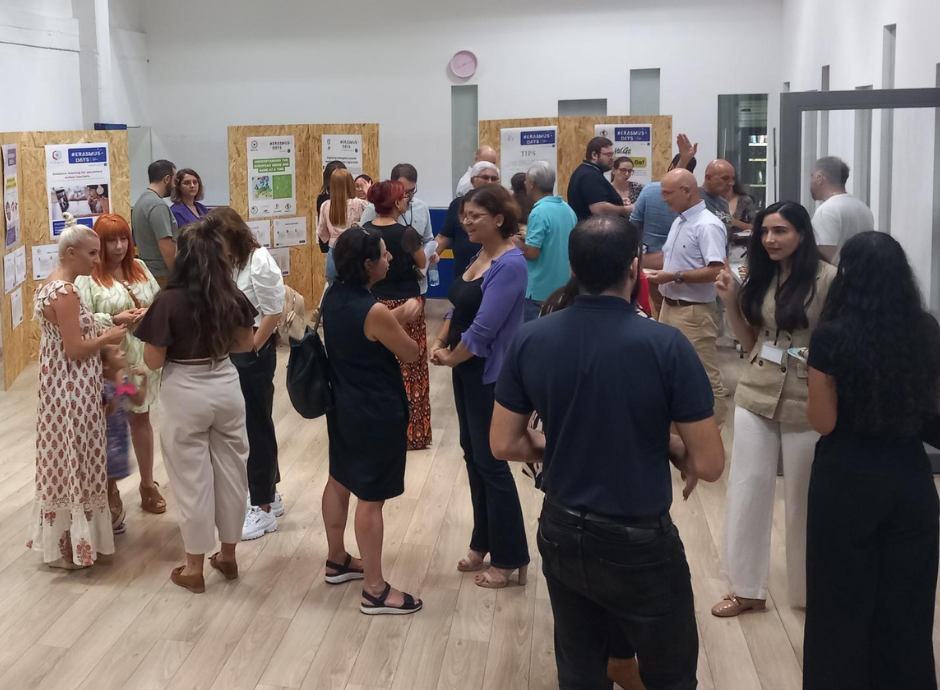Cyprus joined celebrations of the Erasmus Days organised across the European Union, honouring cultural diversity to “make Europe shine”.
Celebrating cultural diversity and making Europe shine is about sharing how Europe allows to be open to the world, said a local Erasmus+ program and training provider, StandOutEdu.
StandOutEdu held an Erasmus+ days celebration event in Nicosia last week.
“The idea is to showcase to participants the many opportunities of Vocational Education Training (VET) available in Europe, including through the Erasmus+ program,” said Thrasos Tilemachou, StandOutEdu’s general manager.
“Erasmus+ Days are the perfect time to explore the opportunities offered by Europe in terms of education, training, and solidarity.
“Thanks to the Erasmus Days, students and employees have the opportunity to find information, discuss and participate in many activities to be more mobile while promoting European projects”.
Erasmus+ is now a well-known program to “discover new cultures, improve the language and intercultural skills, develop employability and comply with the European values of tolerance, respect and diversity”.
StandOutEdu is also celebrating its seventh year in the field of Erasmus Vocational Education and Training (VET) to develop skills to remain employable and active members of society.
“Seven years full of research, networking and innovative ideas, trusted by professionals and hundreds of collaborations over the years,” said Tilemachou.
“The European Year of Skills, which started on 9 May and will last a year, offers an excellent opportunity to bridge the skills gap in the European Union and improve the European strategy on this matter”.
The EU sets several thematic areas to help young people acquire the skills necessary to access quality jobs while showcasing the national actions to eliminate the social exclusion of groups such as older people and people with special needs.
StandOutEdu organises VET training and participates in different collaborations focused on creating integrated and innovative curricula.
“We focus on people with fewer opportunities in education and work, for example, people on the autism spectrum, migrants, people with disabilities, and seniors.
“An example project would be the MBAT4Seniors, a collaboration that aimed to create an educational package to help seniors stay active during COVID-19, enhancing their mental health and well-being”.
The organisation also delivers projects on new technologies in education using innovative tools such as electronic learning platforms, augmented reality, virtual reality, and artificial intelligence.
“Green policies and environmental literacy could not be excluded.
“Raising awareness on how to be part of the effort being made across Europe to prevent climate change and the destruction of the environment”.
An example project, DGVET, a collaboration to develop a gamified e-learning platform to empower Young women and men into the Green economy and Agriculture 4.0
“Another project we take particular pride in is the Financialit4Women.
“It is a collaboration that aims to develop gamified tools, such as a board game, inspiring young women to get more involved in entrepreneurship and financial literacy,” said Tilemachou.
Erasmus+ Key in Numbers
Since the UK left the EU, 33 countries have participated in the Erasmus+ program: the 27 Member States of the EU, Iceland, Liechtenstein, North Macedonia, Norway, Serbia, and Turkey.
About 200 countries in the world with the status of partner country may participate in certain actions of Erasmus+, in addition to the 33 countries of the program.
Since 1987, the program’s creation date, 12.5 million people have benefitted from training provided within the Erasmus+ framework.










